
Speech Pathology - Graduate Program
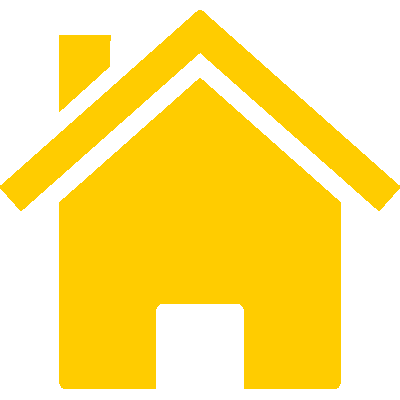
- Overview
- Admission
- Degree Plan & Courses
- Graduate Course Sequence
- Scholarships, Assistantships, Financial Assistance
- Student Resources
- Student Outcome Data
- 2024 Graduate Handbook
Graduate Program - Clinic Scope of Services
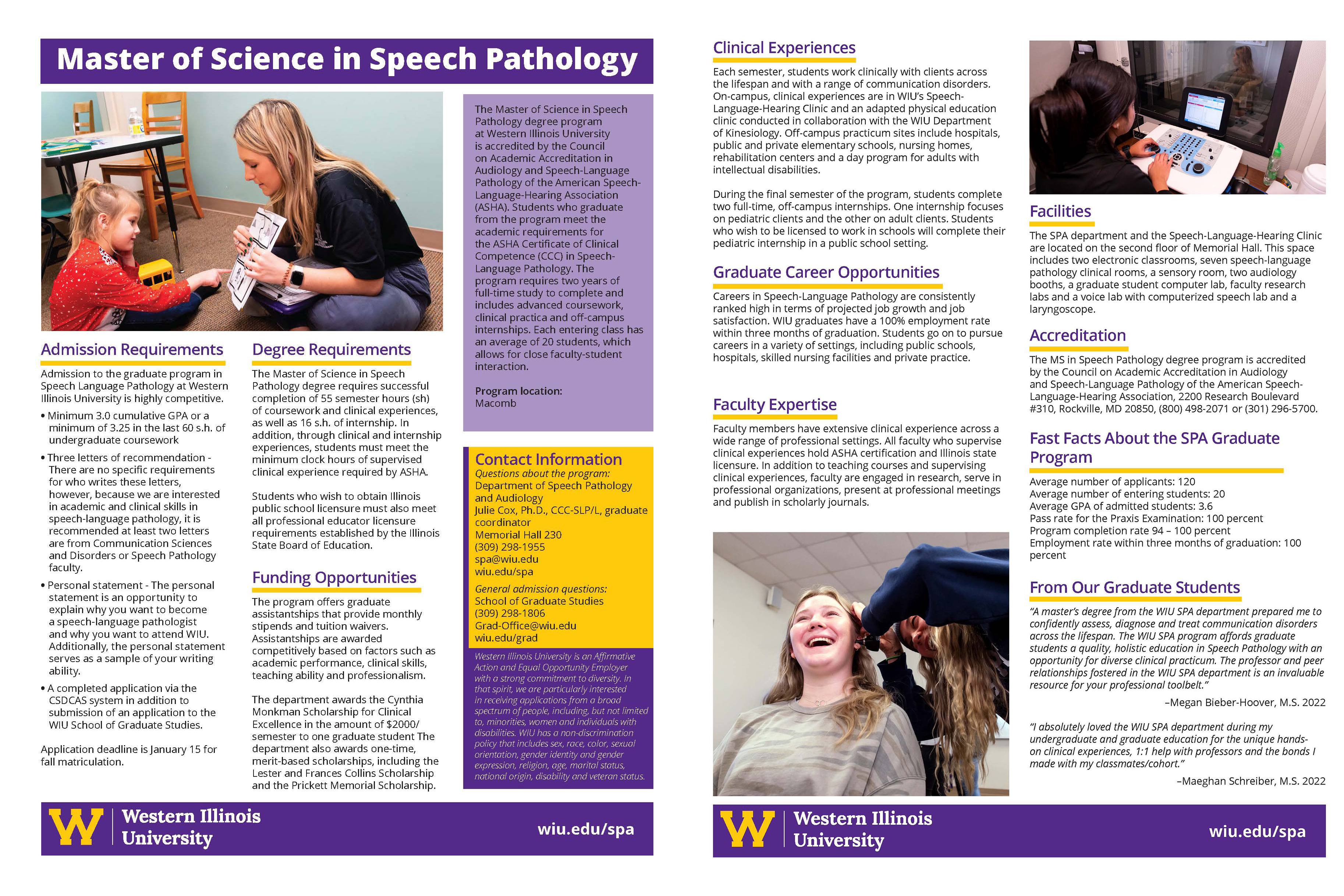
The Masters of Science in Speech Pathology at Western is nationally accredited by the Council on Academic Accreditation (CAA) of the American Speech-Language-Hearing Association (ASHA). The graduate program in speech pathology is comprised of 39 semester hours of didactic coursework, in addition to clinical experiences which vary throughout the duration of the program.
SPA graduate students take advanced coursework and undertake an extensive program of clinical practicum. Graduate class sizes average 20-25 students. Practicum experiences are in the WIU Speech-Language-Hearing Clinic, as well as a number of off-campus hospitals, nursing homes, schools, rehabilitation centers, etc. Students gain experience working with clients of various ages, and with a variety of speech, language, and hearing disorders.
At the completion of the B.S. and the M.S. degrees, all SPA students meet both academic and clinical practicum requirements necessary for obtaining the Certificate of Clinical Competence from ASHA and licensure for the state of Illinois. Both ASHA and the state of Illinois also require the successful completion of a national exam and a clinical fellowship year. Students who complete the program and pass Illinois State of Board of Education examinations will be eligible for Professional Educator Licensure (PEL) in the state of Illinois.
Our faculty provide a supportive environment for students to grow as professionals and as a result our students have a high success rate in meeting the requirements to become a practicing SLP and in finding a job after graduation. See our "Student Outcome Data" by clicking on the "Student Outcome Data Tab" for more information.
Questions about the Speech Pathology and Audiology Graduate Program
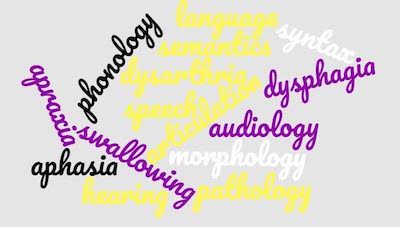
Interested in the Graduate Program in Speech-Language Pathology? We would love to host a visit for you! We conduct open houses in the fall and spring semesters, but we also offer one-on-one visits for anyone interested.
During a visit, you will meet with the Graduate Coordinator, attend a graduate level course (if scheduling allows), and spend time with current graduate students to learn their perspective on the program.
Graduate Coordinator
 |
Julie L. Cox (Ph.D., CCC/SLP) Assistant Professor Graduate Coordinator Office: 245 Memorial Hall Phone: (309) 298-1955 Email: JL-Cox3@wiu.edu |
Fall 2025 Admission Timeline
January 15, 2025 - Deadline to apply
January-February - First round of review, and invitations to Welcome Party
April 15, 2025 - National deadline to accept offers
August 25, 2025 - Classes begin
Admissions to the Graduate Program
Our application deadline is January 15.
Applicants must submit both an application/application fee to WIU Graduate Studies and an application/application fee to WIU Department of Speech Pathology & Audiology via the Communication Sciences & Disorder Centralized Application Service, known as CSDCAS. Applicants who do not submit both applications will NOT be considered for admissions.
Official transcripts must be sent to both WIU Graduate Studies and CSDCAS.
Admission Requirements
In order to be eligible for admission to the graduate program in Speech Pathology, applicants must have prerequisite coursework in the following areas:
- Anatomy & Physiology of the Speech & Hearing Mechanisms (SPA 210)
- Phonetics (SPA 212)
- Speech & Hearing Science (SPA 311)
- Normal Development of Speech & Language (SPA 312)
- Audiology (SPA 390)
- Communication Disorders (varies; SPA 381, 385, 386)
In addition, applicants must complete the following ASHA requirements prior to or during the graduate program:
- Statistics
- Biological Science
- Physical Science
- Social Science
Western Illinois University Graduate Studies Application
Applicants must submit an application directly to WIU. The application is online and can be found at the following address: Application for Admission

As part of this application you must submit the following:
- Online application form
- Official Transcripts from all universities/colleges you have attended
- Personal statement/essay
Use the same statement/essay you submit via the CSDCAS system. - Three letters of reference
Letters may be submitted online or via hard copy. If you choose the online option your recommenders will receive a link to the recommendation form via email.
Ask the same recommenders you use for the CSDCAS system. - If you wish to be considered for a graduate assistantship position, please answer the relevant questions on the Assistantship link on the left side of the online application screen.
- A $30 application fee
CSDCAS Application
Applicants must also submit an application via the Centralized Application Service, known as CSDCAS. This system can be accessed via the following link: CSDCAS.
As part of this application you must submit the following:
- All application materials requested by CSDCAS including
- Online application
- Official transcripts
- Personal statement/essay
- Three recommendation letters
- Application fee
International Student English Requirements
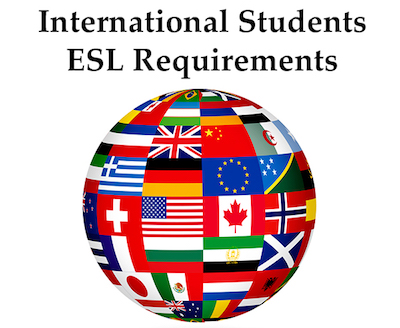
English Proficiency Non-Native English Speakers Graduate students who are non-native speakers of English are assessed during their first semester of graduate school. The clinical faculty conducts informal screening of the intelligibility and oral communication, in English, of all graduate students.
Any student, whatever his or her native language, who is identified by an instructor, whether academic or clinical, as having spoken or written language proficiency that does not meet the above standard will be offered the opportunity to receive assessment and intervention through appropriate venues, to include the program's Speech-Language-Hearing Center. The student will not be required to participate as a client in therapy; however, the student will be held responsible for development of communication skills sufficient to achieve effective clinical and professional interaction with clients and relevant others. Efforts will be made to assist students in locating appropriate services/resources.
Appropriateness of continuation as a student clinician in clinic will be made on a case-by-case basis if a student has been identified as presenting a deficiency in spoken and/or written English.
Students who have been identified as needing services to improve their English must be approved by the Clinic Committee for admission into, or continuation of, the clinical practicum experience. International students must achieve a Test of English as a Foreign Language (TOEFL) score of 550 (paper-based exam); or 79 (iBT). They may alternatively submit a score of 6.5 or better on the International English Language Testing System (IELTS).
Graduate Degree Requirement
The Master of Science in Speech Pathology degree program requires a minimum of 54 hours.
I. Core Courses: 39 s.h.
- SPA 501 Introduction to Research Methods in Speech Pathology (3)
- SPA 503 Seminar in Professional Affairs (2)
- SPA 510 Motor Speech Disorders (3)
- SPA 514 Assessment and Treatment of Child Language Disorders (3)
- SPA 515 Autism and Special Populations. (3)
- SPA 521 Methods in Public Schools (3)
- SPA 523 Neurological Disorders I: Aphasia (3)
- SPA 524 Neurological Disorders II: Cognitive and Degenerative Disorders (3)
- SPA 525 Dysphagia: Assessment and Intervention (3)
- SPA 535 Voice Disorders (3)
- SPA 547 Fluency and Fluency Disorders (2)
- SPA 548 Articulation and Phonological Disorders (3)
- SPA 549 Augmentative and Alternative Communication (3)
- SPA 550 Audiology for the Speech-Language Pathologist (2)
- SPA 587 Clinical Practicum in Speech-Language Evaluation (variable)
- SPA 588 Clinical Practicum in Speech-Language Pathology (variable)
- SPA 604 Graduate Portfolio (0)
II. Core Clinical Courses: 16 s.h.
- SPA 587 Clinical Practicum in Speech-Language Evaluation (4)
- SPA 588 Clinical Practicum in Speech-Language Pathology (9)
- SPA 590 Speech-Language Group Practicum (3)
III. Select one of the following internship options:
- A. Internship: 16 s.h.
- SPA 600 Internship in Communication Disorders (16)
- B. Public School Internship: 16 s.h.
- SPA 522 Internship in the Public School (8)
- SPA 600 Internship in Communication Disorders (8)
In addition to the coursework above, all students must complete all clinical clock hours required for the American Speech-Language-Hearing Association Certificate of Clinical Competence (CCC) before the master's degree will be awarded.
Graduate Program Course Descriptions
501 Introduction to Research Methods in Speech Pathology. (3)
Explores clinician's role as researcher and need for science to inform our clinical practice. Students read and critically analyze existing research within the communication sciences and disorders, and review common research designs and data analysis techniques. Students are required to complete a formal project.
503 Seminar in Professional Affairs. (2)
The study of current problems, issues and legislation in the communication disorders profession. Discussions will be organized to accommodate both student and instructor interests and concerns. Prerequisite: Graduate standing in SPA.
510 Motor Speech Disorders. (3)
Study of assessment and intervention methods for apraxia of speech and the dysarthrias across the lifespan. Includes study of the etiology and characteristics of motor speech disorders as well as relevant anatomical, physiological, developmental, cultural, and psychological correlates. Prerequisites: Graduate standing in SPA or permission of the instructor.
514 Assessment and Treatment of Child Language Disorders. (3)
Study of assessment and intervention methods for child language disorders. Principles of evidence based practice will be emphasized. Issues related to English language learners and literacy will be discussed. Prerequisites: Graduate standing in SPA or permission of the instructor.
515 Autism and Special Populations. (3)
The study of assessment and intervention methods for children with Autism Spectrum Disorder and other special populations including cognitive impairments, sensory processing disorders, ADHA, emotional/behavioral disorders, low incidence populations and multiply disabled children.
521 Methods in Public Schools. (3)
The study of general program considerations for the speech-language pathologist in the public school setting including case management and state and federal legislation.
522 Internship in the Public School. (variable)
Supervised clinical practice in speech–language and/or hearing in the public school setting. Prerequisites: SPA 521, completion of required SPA coursework, no more than one C grade in SPA 587/588, and approval of faculty.
523 Neurological Disorders I: Aphasia. (3)
Assessment and management of fluent, nonfluent, mixed, and global aphasia, with emphasis on the nature and cause of acquired language disorders in adults, including right hemisphere disorder. Prerequisite: Graduate standing in SPA or permission of the instructor.
524 Neurological Disorders II: Cognitive and Degenerative Disorders. (3)
Identification, classification, and treatment of degenerative disorders and cognitive/memory disorders that affect speech and language, with emphasis on intervention across the continuum of care. Prerequisite: Graduate standing in SPA or permission of the instructor.
525 Dysphagia: Assessment and Intervention. (3)
The study of swallowing and deglutition across the age span, with concentration on the methods of assessment and intervention in disorders of swallowing. Prerequisites: SPA 210, 312 and 382.
535 Voice Disorders. (3)
Voice production, including vocal development and life–span changes. Pathophysiology of voice disorders, their assessment, management and treatment. Prerequisites: Graduate standing in SPA or permission of the instructor.
547 Fluency and Fluency Disorders. (2)
Theory, research and clinical applications in fluency disorders. Emphasis on assessment and treatment of behavioral, affective, and cognitive features of developmental stuttering across the lifespan. Consideration of cluttering, neurogenic stuttering, psychogenic stuttering. Prerequisite: Graduate standing in SPA or permission of the instructor.
548 Articulation and Phonological Disorders. (3)
The study of assessment and intervention methods for children with articulation and phonological disorders. Includes study of etiology and characteristics as well as relevant anatomical, physiological, developmental, linguistic, cultural, and psychological correlates. Prerequisites: Graduate standing in SPA or permission of the instructor.
549 Augmentative and Alternative Communication. (3)
Study of the various alternative and augmentative communication techniques and assistive technologies including the assessment and intervention strategies utilized to implement them. Prerequisites: Graduate standing in SPA or permission of the instructor.
550 Audiology for the Speech-Language Pathologist. (2)
Study of selected auditory disorders, screening procedures, and habilitation/rehabilitation approaches from a speech-language pathology perspective based upon current scope of practice and research. Prerequisites: Graduate standing in SPA or permission of the instructor.
587 Clinical Practicum in Speech-Language Evaluation. (variable)
Supervised practicum in speech-language evaluation procedures in the Speech-Language-Hearing Clinic. Prerequisite: Graduate standing in SPA or permission of the instructor..
588 Graduate Clinical Practicum I Speech-Language Pathology. (variable)
Supervised clinical experience in on–campus and off–campus clinical facilities while working with children and adults having speech and language disorders. A minimum of 15 contact clock hours must be obtained for each credit hour. Prerequisite: Permission of the instructor.
590 Speech-Language Group Practicum (3-4)
Supervised clinical experience working with children receiving speech, language, and pragmatic disorders in organized group settings. Prerequisite: Graduate standing.
599 Graduate Clinical Practicum in Audiology. (variable)
Supervised clinical experience in on–campus and/or off–campus clinical facilities while working with children and adults having hearing impairments. Prerequisite: Permission of the instructor.
600 Internship in Communication Disorders. (variable)
Supervised applied experience in an occupationally related area in line with the students' career objectives and approved by faculty. A minimum of eight weeks will be required for this experience. Prerequisites: Completion of required SPA coursework, no more than one C grade in SPA 587/588, and approval of faculty.
601 Thesis. (3)
604 Graduate Portfolio. (0)
Supervised applied experience in an occupationally related area in line with the students' career objectives and approved by faculty. A minimum of eight weeks will be required for this experience. Graded S/U. Prerequisite: Completion of required SPA coursework, no more than one C grade in SPA 587/588, and approval of faculty.
Graduate Course Sequence
Fall 1510 - Motor Speech Dis (3) 523 - Aphasia (3) 548 – Artic & Phono Dis (3) 550 – Aud for the SLP (2) 587 - Diagnostics (1) 588 – Speech-Language Clinic (3) 599 * - Audiology Clinic (1) 604 - Portfolio (0) |
Fall 2535 – Voice Disorders (3) 515 – Special Pops (3) 524 – Cognition (3) 549 – AAC (3) 587 - Diagnostics (1) 588 – Speech-Lang Clinic (3-4) 599* - Audiology Clinic (1) 604 - Portfolio (0) |
Spring 1501 - Research Methods (3) 514 - Child Lang Dis (3) 521 – Pub Schl Methods (3) 525 – Dysphagia (3) 587 - Diagnostics (1) 588 – Speech-Lang Clinic (3-4) 599* - Audiology Clinic (1) 604 - Portfolio (0) | Spring 2522 – Public School Internship (8) 600 – Internship in CSD (8) 604 – Portfolio (0) |
Summer 1503 – Prof Affairs (2) 547 - Fluency Disorders (2) 587 - Diagnostics (1) 588 – Speech-Lang Clinic (1-2) 590 - Speech Groups (3-4) 599* - Audiology Clinic (1) 604 - Portfolio (0) |
|
* Take ONCE during the programTo download in PDF Graduate Course Sequence | |
Graduate Assistantships
Graduate assistantships are award programs which provide students with work opportunities in a job closely related to the academic field of study. Assistantships are awarded on a competitive basis using academic performance (e.g., undergraduate GPA or Graduate GPA, recommendations), clinical performance, and professional attitude as criteria. Students with graduate assistantships in Speech Pathology receive a monthly stipend and a waiver of tuition. Salaries for assistantships are set at the Vice Presidential level. Appointees on a two-month contract or greater will receive a tuition waiver for the period of appointment. The waiver does not include insurance costs or student fees.
Graduate assistants must adhere to the same standards of professional ethics as regular faculty. Assistants must meet their normal assigned duties but are not be asked or required to perform additional duties and complete jobs assigned to them throughout their assistantship. Graduate assistants must be full-time students (at least 9 semester hours) without other employment. Graduate assistants must also maintain a 3.0 G.P.A.
It is a requirement that GAs live in the Macomb region, and must commit to assisting with evening and weekend study sessions and events.
Scholarships
We also have 2-4 smaller awards ranging from $500 to $1500 that are selected by the faculty.
Student Clinical Sites and Other Resources
Clinical Sites
Students enrolled in clinical practicum may be located on campus at the Speech-Language-Hearing Clinic as well as at one of several off-campus sites supervised by WIU SLP faculty including but not limited to the following:
- Bridgeway Rehabilitation Center, Macomb, IL
- Elms Nursing Home, Macomb, IL
- Macomb Public Schools, Macomb, IL
- Monmouth-Roseville Schools
- West Prairie North
- West Prairie South
Speech Language Hearing Clinic Library/Workroom/Computer Lab
A library/work room is available at the clinic. A wide variety of tests, materials and clinic forms for use in therapy are located here. Ample space is provided for clinicians to prepare for speech therapy sessions. A computer lab is available exclusively to our clinicians, which is useful for the completion of clinic reports using our electronic medical record (EMR) system, as well as word processing necessary for academic work. A copy machine is located in this area as well.
Web resources for SLP students:
Program Completion Rate
| Academic Year | On-Time Completion | Extended Program | Not Completed | On-Time Completion (%) |
| 2023-2024 | 16 | 0 | 1 | 94% |
| 2022 - 2023 | 15 | 0 | 0 | 100% |
| 2021 - 2022 | 18 | 1 | 0 | 94% |
| 3 year average | 96% |
PRAXIS Examination Pass Rate of Graduates
| Time Period | # taking the exam | # passed the exam | Pass rate (%) |
| 2023 - 2024 | 16 | 15 | 94% |
| 2022 - 2023 | 15 | 15 | 100% |
| 2021 - 2022 | 16 | 16 | 100% |
| 3 year average | 98% |
Speech-Language Pathology Graduate Student Handbook
Download the Speech-Language Pathology Graduate Student Handbook.

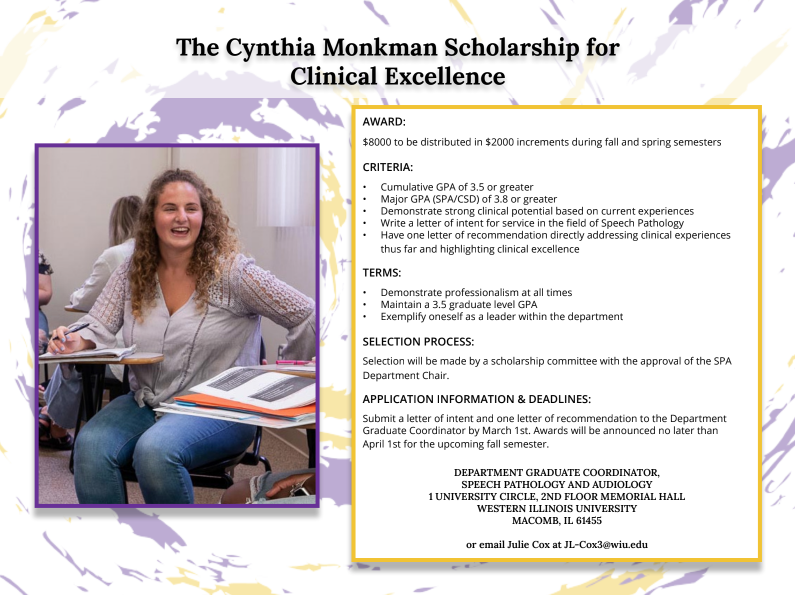
Connect with us: